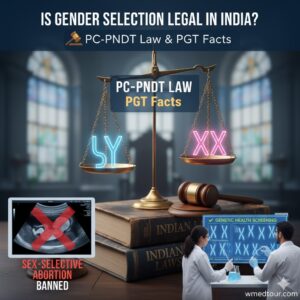Is Gender Selection Legal in India? ⚖️ PC-PNDT Law & PGT Facts
✨ Executive Summary: Key Takeaways on Gender Selection in India
You ask, “Is **gender selection legal in India**?” The answer is a decisive **No** for non-medical reasons. India implements one of the world’s most rigorous laws, the **Pre-Conception and Pre-Natal Diagnostic Techniques (PC-PNDT) Act, 1994**. This law **prohibits all forms of sex determination** and any subsequent **sex-selective abortion**. Furthermore, this prohibition includes traditional methods like ultrasound and advanced techniques like Preimplantation Genetic Testing (PGT) when used for family balancing.
- 🚫 **Non-Medical Gender Selection is Illegal:** India strictly bans PGT use for **family balancing**.
- 🚨 **PC-PNDT Act:** This law acts as the main legal barrier. It makes both the procedure and the communication of a fetus’s sex punishable offenses.
- ✅ **Medical Exception:** PGT has one key legal exception. Clinics can use it **only** to screen for severe, sex-linked genetic disorders, such as Duchenne Muscular Dystrophy. Selecting a gender unaffected by the disease becomes a medical necessity then.
- 🌍 **International Alternatives:** Strict Indian laws prompt many citizens and expatriates to seek legal **gender selection** services elsewhere. Countries like the USA, Thailand, or Turkey permit PGT for family balancing. Learn more about fetal gender selection best countries 2025.
🇮🇳 The Legal Reality: Is Gender Selection Legal in India?
The issue of **gender selection legal in India** connects directly to the country’s social history. Historically, a clear gender preference has caused a marked demographic imbalance. The government responded decisively to this problem. They passed legislation banning the use of medical technology to determine and select the sex of a child, which often favored males.
Therefore, here is the short, clear answer: Performing or helping with **gender selection** for social reasons, or for family balancing, is **absolutely illegal** in India. This ban covers all diagnostic methods, both prenatal and pre-conception.
📜 The Pillar of the Ban: The PC-PNDT Act, 1994
The **Pre-Conception and Pre-Natal Diagnostic Techniques (Prohibition of Sex Selection) Act, 1994**, forms the core of this prohibition. Lawmakers enacted this comprehensive law specifically to stop female foeticide. Furthermore, it addresses the country’s declining child sex ratio effectively.
The Act makes it illegal for anyone to use pre-natal diagnostic techniques to tell a couple the sex of the fetus. Consequently, the government mandates the registration of all clinics and centers performing these techniques. This ensures strict government oversight.
Penalties Under the PC-PNDT Act
The law outlines severe penalties for violations. This demonstrates the government’s zero-tolerance policy:
- **For Doctors/Clinics:** Doctors face imprisonment extending up to five years and a fine of up to ₹50,000 (about \$600 USD) for the first conviction. Subsequent convictions bring longer sentences and higher fines. Additionally, the government can suspend or cancel the medical practitioner’s registration, effectively ending their ability to practice medicine.
- **For Individuals:** Those who undergo or encourage **sex-selective abortion** also face fines and imprisonment.
As a result, no ethical clinic or doctor in India will offer or discuss **gender selection** for non-medical reasons. The professional and legal consequences are simply too great. For a detailed guide on general fertility treatments, therefore, you may refer to our IVF process ultimate step-by-step guide.
🔬 PGT and the PNDT Act: The Fine Line of Preimplantation Genetic Testing
In assisted reproductive technology, the answer to “Is **gender selection legal in India**?” grows complex when we discuss advanced techniques. These include **Preimplantation Genetic Testing (PGT)**, which doctors perform during an IVF cycle. PGT involves screening embryos before implantation to check for genetic or chromosomal abnormalities.
This technique, which people previously called Preimplantation Genetic Diagnosis (PGD) or Preimplantation Genetic Screening (PGS), can easily determine the sex of the embryo. However, Indian law addresses this clearly and precisely.
⛔ PGT for Family Balancing is Banned
The PC-PNDT Act explicitly covers pre-conception techniques; this certainly includes PGT. As a result, using PGT solely for **non-medical gender selection** (also known as “family balancing”) is strictly **illegal in India**. The law primarily considers the intention behind the genetic test.
Crucial Note: Indian clinics performing IVF and PGT face heavy monitoring. Clinics must maintain strict records. Furthermore, they cannot reveal the sex of the embryos to prospective parents unless a specific, medical exemption is granted and documented by the appropriate regulatory body.
✅ The Legal Exception: PGT for Sex-Linked Disorders
India enforces a narrow, critical exception to the ban on gender selection. This use remains fully legal and even encouraged: using PGT to prevent the transmission of **severe sex-linked genetic disorders**.
You can explore the PGT process in more detail here.
Examples of Sex-Linked Disorders
These conditions reside mainly on the X chromosome. Therefore, they affect one sex (typically males) much more severely than the other (females, who often only carry the gene). Examples include:
- **Duchenne Muscular Dystrophy (DMD):** A progressive muscle-wasting disease.
- **Haemophilia A and B:** Disorders that prevent blood clotting.
- **Fragile X Syndrome:** A genetic condition causing intellectual disability.
If a couple carries one of these severe disorders, Indian law permits PGT use. Doctors can select only those embryos that are of the **unaffected sex** (usually female). Alternatively, they select embryos proven to be free of the mutation. In this specific scenario, selecting the embryo’s sex constitutes a **life-saving medical intervention**, not a social preference. This distinction is vital for ethical practice.
🌐 Navigating Global Options: Why Patients Look Outside India
The answer to “Is **gender selection legal in India**?” is ‘no’ for family balancing. Consequently, many individuals and couples, including Non-Resident Indians (NRIs), look abroad to seek treatment in countries where PGT for non-medical reasons is legal. This decision fuels the growing trend of global medical tourism.
🗺️ Top Destinations for Legal Gender Selection
Several countries legally permit PGT for family balancing. These include:
- **USA:** Most states allow PGT for gender selection.
- **Thailand:** This remains a popular Asian destination for legal fetal gender selection.
- **Turkey:** The country emerges as a strong contender in medical tourism. It offers competitive costs and advanced IVF care. See our guide on medical travel Turkey 2025.
- **Cyprus and Greece:** These European destinations are known for clear PGT laws.
The process of seeking fertility treatments abroad can feel overwhelming. However, resources like our step-by-step IVF abroad guide help streamline the entire journey. You can also review options for fertility treatments abroad.
Comparison Table: India vs. International Options for Gender Selection
| Feature | India (Under PC-PNDT) | International Options (e.g., USA, Thailand) |
|---|---|---|
| **Non-Medical Gender Selection (Family Balancing)** | **Illegal** (Strictly prohibited and penalized) | **Legal** (Permitted in many jurisdictions) |
| **PGT for Sex-Linked Genetic Disease Prevention** | **Legal** (Permitted with medical necessity) | **Legal** (Standard practice) |
| **Sex Determination via Ultrasound/Amniocentesis** | **Illegal** (Banned under PC-PNDT) | Varies; often regulated, but not the primary selection method |
| **Cost of IVF/PGT** | Relatively lower for medical PGT | Generally higher; this reflects legal permissibility and specialized services (See cost of fetal gender selection) |
| **Legal Risks for Patients/Clinics** | Severe legal penalties for illegal gender selection | Minimal to none, provided the laws of the host country are followed |
Furthermore, patients often consider the overall quality of care and the importance of counseling and informed consent. These are crucial components of this sensitive process. Also, consider the specific PGT techniques, such as PGT-A for family balancing.
👨👩👧👦 Who is This For? Understanding the Target Audience
This detailed analysis about whether **gender selection legal in India** targets three distinct groups:
- **Prospective Parents in India:** These couples seek **family balancing**. They must understand the serious legal risks of seeking illegal domestic services. This information helps them find legal alternatives abroad.
- **Couples with a History of Sex-Linked Disorders:** These families face serious genetic risks. For example, they might carry Haemophilia or DMD. They need to know their legal and ethical recourse for using PGT in India to have a healthy, unaffected child.
- **Medical and Legal Professionals:** Clinicians, fertility specialists, and lawyers need an authoritative interpretation of the PC-PNDT Act concerning PGT and gender selection. The distinction between medical necessity and social preference remains paramount for ethical and legal practice.
- **Medical Tourists and NRIs:** Indian citizens living abroad or international patients consider India for IVF. They must know that the legality of **gender selection** in their home country **does not** overrule Indian law when they perform the procedure on Indian soil.
It is important to acknowledge that cultural or personal desires often motivate the pursuit of **gender selection**. Consequently, many people decide to travel abroad for treatment. However, the legal framework in India remains strictly enforced. Reviewing other options, like fetal gender selection guide, can help with your decisions.
⚖️ Pros and Cons: Legal Compliance vs. Family Desire
Understanding the strict legal environment provides clarity. Nevertheless, deciding to proceed (or not) with **gender selection** involves weighing complex factors. These factors are ethical, legal, and deeply personal.
✅ Pros of Adhering to Indian Law (PC-PNDT)
- **Zero Legal Risk:** Compliance provides complete protection from severe fines, imprisonment, and professional license suspension.
- **Ethical Practice:** Law adherence supports national efforts to combat gender discrimination and female foeticide.
- **Focus on Health:** This encourages the ethical use of PGT solely for preventing serious genetic conditions. This is PGT’s main medical purpose.
- **Preservation of Medical Career:** Strict adherence ensures a doctor’s continued licensure and professional reputation.
❌ Cons of the Strict Ban on Family Balancing
- **Denial of Personal Choice:** Couples cannot satisfy a strong desire for a balanced family structure. Consequently, this can cause social and emotional distress.
- **Promotion of Medical Tourism:** The ban compels couples to travel abroad for the procedure. Therefore, they incur higher costs and travel stress.
- **Risk of Unregulated Practices:** Though this is rare and extremely dangerous, desperate couples might seek illegal, underground services. This poses immense health risks.
- **Emotional Burden:** Inability to choose gender creates emotional stress. In some cases, it contributes to social pressure regarding the child’s sex after birth.
Therefore, for most couples, exploring legal options internationally remains the most prudent path for family balancing. These jurisdictions permit the procedure. Making an informed choice requires learning about fetal gender selection risks and success rates globally.
📝 Case Study: The Legal Crossroads of PGT
Hypothetical Scenario: Ms. A and Mr. B’s PGT Journey
Ms. A and Mr. B, an affluent couple, live in Mumbai. They already have two daughters. They desperately want a son for “family completion.” This is a common reason people seek **gender selection** (family balancing). They approach an IVF clinic in India to use PGT to select a male embryo.
The **IVF Specialist’s Action:** The specialist clearly informs them: “**Is gender selection legal in India**? No, not for your reasons.” The doctor explains the severe PC-PNDT Act penalties. These penalties apply to both the clinic and the parents. Consequently, the doctor legally refuses the request for PGT for sex selection.
The specialist then offers two legal pathways:
- **Option 1 (Legal in India):** The couple proceeds with IVF and PGT-A (Aneuploidy screening). Doctors select only the healthiest, genetically normal embryos. However, they do this **without determining or revealing the sex**.
- **Option 2 (Legal Abroad):** The doctor advises the couple to seek the PGT for family balancing procedure elsewhere. They suggest a country where it is legally permitted, such as the USA or Thailand. This keeps them compliant with the law. They receive resources on choosing a surgeon and clinic abroad.
In contrast, consider Ms. C and Mr. D, a second couple. They carry **Haemophilia B**, a severe X-linked disorder. They legally qualify for PGT to screen their embryos. The clinic can legally select a female embryo (who will be a carrier but unaffected). Alternatively, they can select a male embryo proven to be unaffected by the disease. This case clearly shows how the law differentiates between medical necessity and social selection. Furthermore, the selection process uses the most advanced techniques, like those detailed in new methods in IVF in 2025.
This case study illustrates the firm line Indian law draws: PGT is a powerful health tool. Nevertheless, it must not become a means for gender selection outside of serious medical necessity.
💡 Conclusion: Strict Law, Global Choices
The legislative intent behind India’s PC-PNDT Act remains clear and absolute. The Act aims to prevent the misuse of technology for **gender selection**. Consequently, it curbs female foeticide. As an individual or professional, you must accept that all forms of non-medical **gender selection legal in India** are illegal. Furthermore, they carry serious consequences.
The path for individuals seeking family balancing leads internationally. They seek countries with permissive laws, which ensures legal and ethical treatment. At **https://www.wmedtour.com**, we champion transparency and legal compliance. We connect patients with reputable, legally compliant fertility centers globally. Whether you are looking for advanced IVF in Turkey (Turkey Tours) or seeking specialist care in Germany (Medical Travel Germany), we guide you through the regulatory complexities. We also offer resources on medical travel in Iran and medical tourism in Turkey.
Remember this: ethical and legal compliance must always form the basis of your medical decisions. For more detailed information on specific medical travel regulations, you can read our comprehensive global medical treatment regulations guide.
❓ Frequently Asked Questions (FAQ) about Gender Selection in India
Is MicroSort (sperm sorting) permitted for gender selection in India?
No, MicroSort is not permitted. MicroSort, or any sperm sorting aiming to increase the probability of a specific sex, constitutes a pre-conception technique. Because the PC-PNDT Act prohibits all pre-conception techniques for sex determination, MicroSort is also effectively illegal for non-medical **gender selection** in India.
Can an Indian couple travel abroad for gender selection and still be prosecuted?
Indian law applies generally to actions committed within India. The act of undergoing **gender selection** in a country where it is legal is not typically prosecutable. Therefore, the Indian government cannot prosecute actions legal in the country where they occurred. Many couples seek legal **gender selection** abroad to comply with both laws. Read our complete legal medical travel guide for global regulations.
What is the primary reason India banned gender selection?
India banned gender selection to combat gender bias. This bias historically resulted in female foeticide and a severely declining child sex ratio. Therefore, the law aims to stop discrimination before birth and correct this widespread social and demographic imbalance.
Does the PC-PNDT Act only cover ultrasound?
No, the Act does not cover only ultrasound. The Act explicitly covers all pre-natal and pre-conception diagnostic techniques. This includes ultrasound, amniocentesis, chorionic villus sampling (CVS), and Preimplantation Genetic Testing (PGT).
Is it legal to determine the sex of a fetus for curiosity purposes?
No, it is illegal to determine a fetus’s sex for curiosity. The law prohibits any medical professional in India from informing expectant parents of the fetus’s sex. This holds true unless a medical complication requires sex-specific intervention. The mere communication of the sex violates the PC-PNDT Act.
If PGT is done for a medical reason, who must approve the gender selection?
If PGT is necessary to select a gender for preventing a sex-linked disease, the State or Central Supervisory Board must typically review and approve the case. The clinic must also maintain meticulous records.
Can a doctor lose their license for discussing non-medical gender selection?
Yes, a doctor can lose their license. Any attempt to communicate the fetus’s sex, advertise sex determination services, or facilitate illegal **gender selection** can lead to the cancellation or suspension of a doctor’s medical license, in addition to fines and imprisonment.
Are there any proposed changes to the PC-PNDT law regarding PGT?
Technology continues to evolve. However, the core principle of the PC-PNDT Act remains strictly enforced. There are currently no proposals to legalize PGT for non-medical **gender selection** or family balancing in India. Review our full PGT fetal gender selection guide.
What is ‘sex-selective abortion’?
Sex-selective abortion involves terminating a pregnancy solely because the fetus is of an undesirable sex (historically female). This is the key practice the PC-PNDT Act was specifically designed to prevent.
Where can I find more information on IVF and fertility treatments?
Our website offers detailed information on all IVF and fertility treatment aspects. Resources include our guide to fertility problems and IVF abroad, and fertility treatments. We also cover ICSI treatment.
What are the risks of seeking illegal sex determination in India?
Seeking illegal sex determination poses legal and health risks. Beyond the legal consequences (fines, jail), illegal services often occur in unregulated settings. This leads to immense health risks for the mother, including infection, hemorrhage, and even death. Always prioritize legal, accredited care.
How does this law affect international patients seeking fertility treatments in India?
International patients seeking IVF in India must follow the same strict Indian laws. They cannot use PGT for non-medical gender selection while undergoing treatment in India, regardless of the laws in their home country. All patients are subject to the PC-PNDT Act. Find out more about India’s medical travel regulations.



